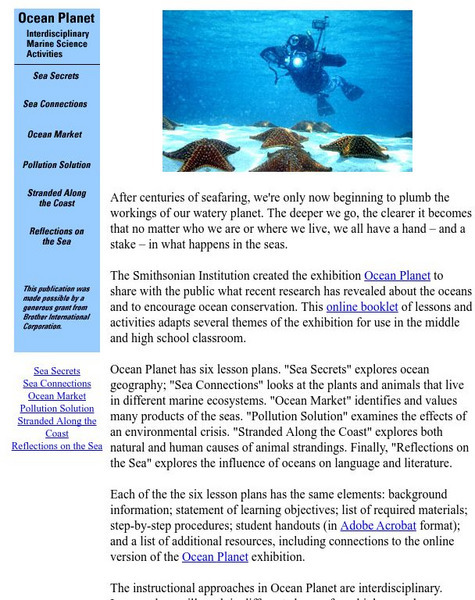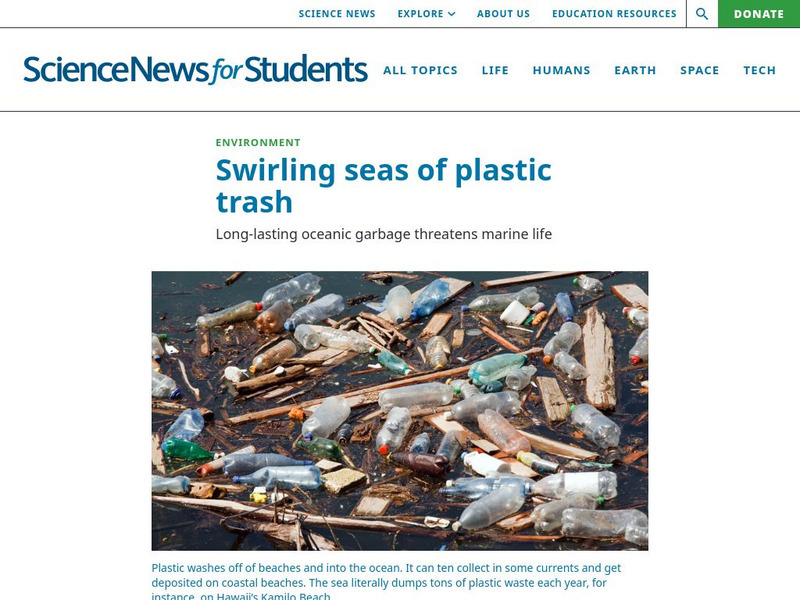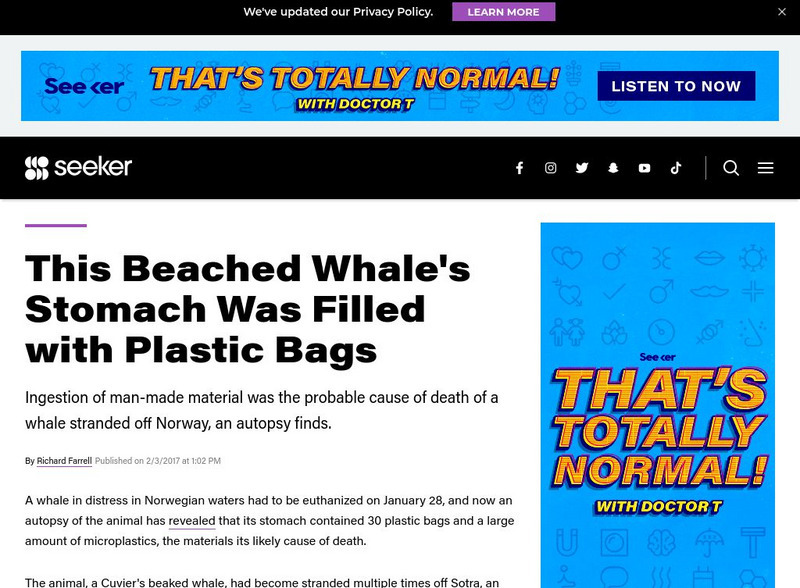Wilderness Classroom
Ocean Life
Our oceans are composed of many complex relationships. Young oceanographers explore relationships between organisms, understand the world ocean's currents, and discover the effects of water pollution and how it behaves. There are three...
Curated OER
Down in the Dumps
After an introduction to municipal sludge, middle school ecologists consider the pros and cons of dumping in the Hudson River Canyon. The class is split into two groups: one to debate in favor or dumping and one to debate against the...
Curated OER
Oil on the Beach
Students explore how oil pollutes the oceans. For this science lesson, students investigate various materials that could be used to clean up an oil spill. Students discuss which materials worked best and how humans can reduce oil spills.
Curated OER
Ocean Pollution
Students explore ocean pollution. In this ecology lesson, students view a video entitled This Pretty Planet and identify common biodegradable products. Students participate in activities designed to simulate the negative effects of...
Curated OER
Oceans and Coasts
Learners explore the topic of marine pollution. They define key vocabulary words, list examples of marine pollution, complete a true/false handout, read an article, and participate in a class discussion.
Curated OER
Ocean Pollution & its Effect on Aquatic Animals
Students consider the concept of ocean pollution. In this ocean instructional activity, students participate in a hands-on demonstration in order to replicate an oil spill and its effects on marine life.
Curated OER
Stewardship Activities
For this ocean pollution worksheet, students read the stewardship activities for ocean pollution. Students list 3 ways to help reduce pollution. Students then draw or write the items in the correct order of decomposition along the timeline.
Curated OER
Ocean Pollution
Students study their role in eliminating ocean pollution and helping keep the oceans clean. In this environmental issues lesson, students define pollution and brainstorm examples of ocean pollution. Students define biodegradable and...
Smithsonian Institution
Smithsonian: Ocean Planet: Interdisciplinary Marine Science Activities
Smithsonian Institution presents ?Ocean Planet: Interdisciplinary Marine Science Activities?. Through this series of six interdisciplinary lessons, students will look at such things as the organisms in different marine ecosystems, the...
American Institute of Biological Sciences
Action Bioscience: Bringing Coastal Dead Zones Back to Life
Increased amounts of nitrogen and phosphorous are leading to "dead" areas on our coastlines. Delve into the details and how to get involved with stopping this from happening.
Other
Clean Ocean Action
This site defines and describes causes of ocean pollution. Easily navigated links to education, research, and current issues on pollution.
University of Wisconsin
The Why Files: Oceans' True Boundaries and "Garbage Patches"
A deep look at ocean circulation returns a surprise: Currents transport water - and non-degradable, floating plastic - between the ocean basins. Thus, some of the plastic in the South Atlantic "garbage gyre" was actually thrown away in...
Other
Uk Rivers Network: Finding Out About Water Pollution
Excellent site covers all types of water pollution. Hundreds of links including books, articles, organizations, specific topics.
NOAA
Noaa: Stressed Out! [Pdf]
In this activity, students investigate factors that affect the health of the oceans. These include overfishing, the destruction of habitats, the invasion of foreign species, the impact of pollution, and the increasing acidification. An...
eSchool Today
E School Today: Your Cool Basics on Ocean Acidification
Looks at ocean acidification, what causes it, the impact of it, and possible ways to reduce it.
Smithsonian Institution
Smithsonian Education: Ocean Planet
A series of lesson plans designed to be used with the Smithsonian Ocean Planet exhibit (available online). Lesson topics include marine ecosystems, pollution of ocean water, animal strandings, and literature.
NASA
Nasa: Creeping Dead Zones
Dead zones are popping up along coastlines all over the world. Find out what they are and the causes of this destructive phenomenon.
Society for Science and the Public
Science News for Students: Cleaning Clothes Dirties Oceans
Describes research into the pollution caused by plastics that are hidden in the fibers of synthetic clothing, and eventually end up in the ocean after laundering. Cites other research that discovered plastic pellets found throughout the...
Society for Science and the Public
Science News for Students: Swirling Seas of Plastic Trash
Describes the multitude of plastic trash scientists have found on a beach in Hawaii and in the oceans. Explains what a gyre is, and how plastic trash gets trapped in the eye of a gyre. Looks at the serious impact plastic materials have...
Scholastic
Scholastic Explorers: Ocean Life
This lesson plan explores how human activity has an impact on turtles, sea otters, and dolphins in different parts of the world. Your students will read field reports from the sites and evaluate data that is offered.
Seeker
Seeker: This Beached Whale's Stomach Was Filled With Plastic Bags
A tragic story comes out of Norway of a whale that could not be saved from debris that had been consumed.
CommonLit
Common Lit: Book Pairings: "World Without Fish" by Mark Kurlansky
Selected (8) reading passages (grades 6-10) to pair with "World Without Fish" by Mark Kurlansky. Mark Kurlansky discusses how humans treat the oceans and the fish that live in them, and what the world will likely look like if fish...
CommonLit
Common Lit: Book Pairings: "Flush" by Carl Hiaasen
After Noah's dad is arrested for sinking a casino boat he believed was dumping sewage into the ocean, Noah must prove that his suspicions are right and stop the boat from further polluting the ocean. Selected (8) reading passages (grades...
Khan Academy
Khan Academy: Activity: Visions of the Future
In this activity, you will brainstorm a problem affecting the world, envision how you think this problem will affect the world in 100 years, and propose a solution. The Great Pacific Garbage Patch is used as an example of a current world...







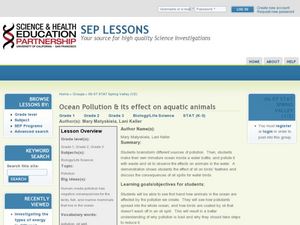


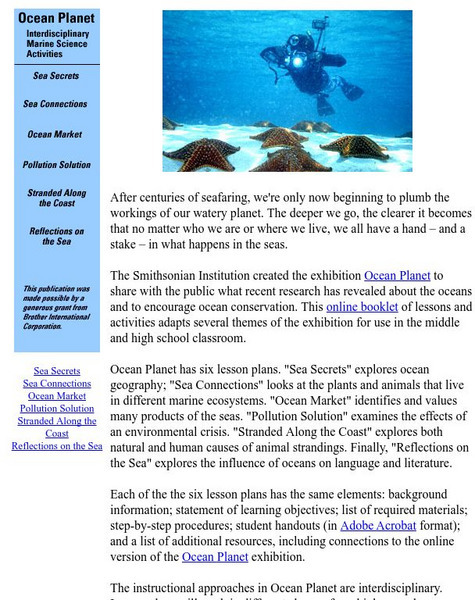
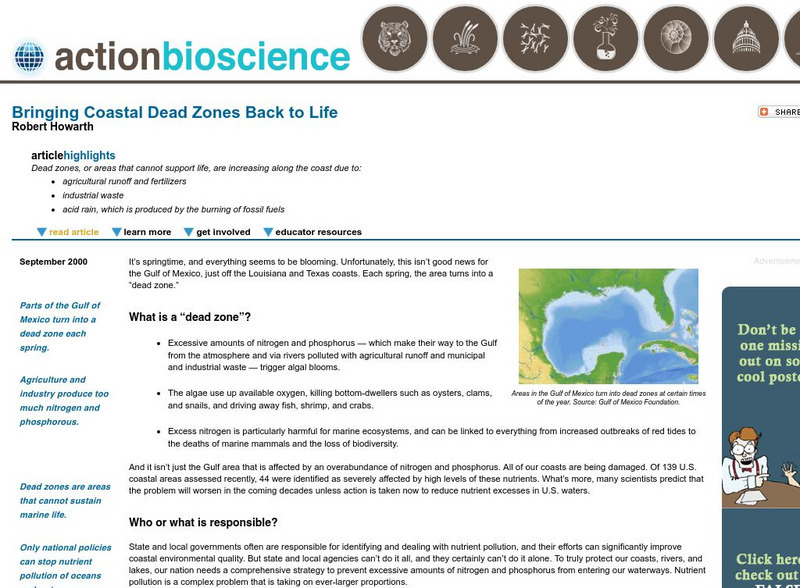



![Noaa: Stressed Out! [Pdf] Lesson Plan Noaa: Stressed Out! [Pdf] Lesson Plan](https://d15y2dacu3jp90.cloudfront.net/images/attachment_defaults/resource/large/FPO-knovation.png)

